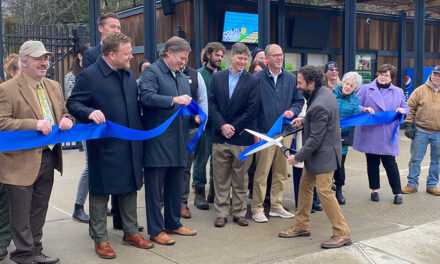If approved, voters would decide an increase in their taxes in November
MELROSE — It’s official: Mayor Robert J. Dolan this week went public with his request for an override of Proposition 2 1/2, saying the city’s shifting demographics and maxed out ability to invest any more money in its departments are jeopardizing Melrose’s future stability.
Dolan made his pitch to the aldermen this week as he turned over his 14th city budget for their review. The School Committee was also at the Monday meeting.
If the aldermen approve the override question, it would be put on the November 3 city election ballot for a citywide vote. Dolan will be on that same ballot as a candidate for reelection.
The override request is now before the aldermen’s Appropriations Committee, which may decide what to do as early as June 18.
Dolan told the aldermen and the school board:
“My job as chief executive officer of this city is to tell you, the citizens of Melrose, what my concerns are and offer my professional recommendation. You cannot fix difficult problems without hard solutions.
Tonight I propose something that I take very seriously. I have looked at this from every angle, and it has weighed on me for some time. The City of Melrose needs a tax override. This is my professional opinion, as a trained public administrator with 14 years’ experience as mayor, and, personally, as a taxpayer, a parent, a son, an uncle, and someone who loves his community.
”This evening I propose to the Board of Aldermen a ballot question to be placed before the citizens of Melrose for their consideration this November. I propose this measure in order to advance public education, to advance public safety, as well as to sustain the successful financial foundation we have built over the last decade, even during the hardest economy since the Great Depression, for our time now and for decades to come. This is not an easy thing to propose, but in my opinion it is necessary.
”Tonight, I will lay out the reasons why I have made this proposal, and I will ask every citizen to become informed regarding this issue, make up your own mind, and be part of a community discussion and vote that will dictate the future of your city.
”On an individual basis, this translates into a property tax increase, on average, of $240 per year or $20 per month. It is a total increase of $2,250,000. It will fund much-needed educator positions at all levels: 5.5 elementary teachers, 6 secondary teachers, and one district-wide educator for technology integration. In addition, this investment in our community will eliminate the structural deficit in our public schools, increase vital line items for professional development and materials, and allow us to hire two additional police officers, which we absolutely need to enhance our public safety and reduce overtime costs.
”This override proposal is very different than previous proposals in our city’s history. Melrose in 2015 is a stable and strong community.
• We have the highest bond rating in the history of the city;
• We have the highest property values and the hottest real estate market in the region;
• Throughout the city you can see visible advancements and investments in our community;
• Volunteerism and citizen involvement have never been higher;
• We make incredible commitments to the arts, culture, athletics, health, our neighborhoods, our houses of worship, and caring for our elderly and disabled and our less fortunate;
• The City of Melrose has a statewide reputation for efficiency, innovation, sound planning, regionalization of services, and good management.
”The issue before us today, unlike in previous decades, is that we have reached an absolute cap in our ability to invest any further in public education and public safety. That in turn will hurt every department in the City as well as our quality of life in the future. Due to considerable withdrawal of state and federal funds, and a change in demographics that is bringing more children into our schools, we are forced to use reserves to maintain what we have, which will result in in a weaker financial outlook.
”We are stable and strong today. We are not in crisis yet, but why wait? Now is the time to take action to prevent the crisis that will happen if something is not done.
”There are certain facts about Melrose that warrant the proposal I put before you today.
• Unlike our neighbors, Melrose is a predominantly residential community. We are 94 percent residential and only 6 percent commercial. The communities around us have substantial commercial bases that drive revenue through taxation. We do not have that, and we never will. I believe the residents of this City place great value on preserving our largely residential makeup. That does not mean we have done nothing to expand our commercial base: We have targeted smart growth around our railway lines to encourage responsible economic development, but this is very small. I believe that as a community we need to continue to value our conservation land and vast green spaces, including Mount Hood, the Middlesex Fells, Pine Banks, Swains Pond, and Towner’s Pond. I believe it is important to have strong zoning and a strong Planning Board that protect our community. There is simply no land available, nor will there be, for large commercial districts or industry. I am not in favor of changing policy that dramatically affects the makeup of our city in a manner that degrades our quality of life and what makes Melrose special, to solve the financial challenges we face. Other cities around us have done that, and I think those decisions have resulted in making them less desirable communities.
• Melrose is not an inexpensive place to live, but the facts show that our average tax bill is significantly lower than those of our neighbors in the real estate market. Our average residential tax bill is less than Wakefield and North Reading and far less than our real estate peers: 32 percent less than Arlington, 30 percent less than Reading, 20 percent less than Natick, and 55 percent less than Bedford. These are cities with far more industry and far higher tax bills, predominantly to support public education. Let me be clear: We should only care about Melrose, but that is an incredible disparity. I am not proposing we go anywhere near these other communities’ tax rates, because it is unnecessary and we shouldn’t. But the fact is, we have incredibly high property values, with some real estate agents claiming that home values have gone up over $100,000 in one year. That doesn’t happen by accident, and it can only be maintained in the future through continued, responsible investment in public education to support new families and to ensure that real estate consumers see Melrose as a place that is advancing and improving their children’s educational future. No one will make the most important financial investment they will make in their life, their home, in a community where they do not feel strongly that their children will have better opportunities than they had.
• State and federal funding are going away and they are not coming back. Melrose has seen a reduction of $5 million in state and federal assistance since 2009. We have less state aid than we had in 2001. Special education costs continually rise, yet assistance lessens and mandates increase. Important Title I programs that help early learners have been reduced. The kindergarten grant was eliminated by the Governor in his budget. Regulations and mandates have increased, yet funding to support them is zeroed out. Melrose and other cities and towns are on their own. I believe this proposal puts control into our own hands at the local level and leaves us less dependent on state and federal funding, which are dangerous and unreliable because they are susceptible to the ups and downs of the economy. You can’t build a future on what might not be there.
• We are seeing one of the greatest influxes of school age children since the 1970s, as a result of a robust real estate market. The Early Childhood Center is now at capacity. The pre-K through grade 3 population has exploded. We have seen well over 100 students sign up for the Melrose public schools since the first day of school. The estimate of next year’s kindergarten class could be as high as 320 students, a considerable increase over this year’s total of 274. We simply do not have enough teachers to teach them. We are seeing one of the challenges of a robust community, which is that Melrose is now identified as one of the strongest family housing markets in Massachusetts. We need to invest now for continued success.
• It is not right to ask taxpayers for more when government hasn’t reformed itself. Few communities have reformed more than Melrose. Melrose was the first city in the history of the Commonwealth of Massachusetts, a few years ago, where 17 unions and non-union employees voted to freeze their wages, avoiding dramatic reductions in the city’s budget. The City of Melrose was the first, with the support of its unions, to join the Group Insurance Commission, saving millions in insurance costs. We have continuously signed responsible contracts with our unions in a non-confrontational environment. We have been the state’s leader in regionalization practices, saving money while building efficiency in areas like public health and veterans’ services. Few cities have sought out and won more School Building Assistance money, MassWorks money, planning grants, Green Energy money, or other grants per capita than the City of Melrose. We have managed our debt responsibly. We started our own ambulance company. Memorial Hall and Mount Hood are at capacity. Our yearly audits by outside evaluators, including Moody’s and Standard & Poor’s, are beyond reproach. Every project has been on time and on budget, and there has been unprecedented dialogue on community issues through blogs, Twitter, and our own accessibility. We have been a leader in green policy that has saved hundreds of thousands of dollars.
”We have done the hard work to offset massive reductions in state and federal aid, and it is simply unrealistic to believe that the City of Melrose can continue to subsidize the responsibilities of the Commonwealth of Massachusetts and the federal government. Our budget must be supported by citizens who believe in the city in which they live. That is the new reality.
”We are a stable and well managed community, but we are not able to devote one more dollar to operate our public schools in future years. In fact, we needed a supplemental budget of over $700,000 to balance the current school budget, and we will need to do so again next year. There is little or nothing left for other city departments and no flexibility to deal with unexpected situations. Being such a desirable community in which to live brings additional costs as the population changes. We can no longer count on Washington or Boston or hope or short-term fixes to get us through the next decade. This is a structural problem that is not going away, and that in many ways has been a burden on this community for my entire lifetime.
”It is going to be our choice whether or not to invest in and advance our schools and our city, understanding that money doesn’t solve all the issues, but it is a fact that you don’t ever get what you don’t pay for.
”There is no way to sugar-coat the fact that if passed, this will be a burden on some of our citizens. Therefore I am also proposing measures that will alleviate some of this additional financial burden on citizens of lower income. That is the responsible approach.
”Every citizen is going to have to make up their own mind. I am simply offering a proposal that I believe is necessary. That is my job. It is your job to make the decision.
”I personally will vote yes, because I believe that our City needs it. I believe that all students deserve a competitive educational experience with their peers in other communities. With this proposal’s success, we can take, for at least the next decade, the fate of our children’s educational experience, as well as the fate of our property values, out of the hands of a dysfunctional federal government, the overwhelming challenges of Beacon Hill, the dips and blips of the economy or political will. Your child’s education should not be determined by how much snow we get in a winter. We need to place these decisions in our own hands, the hands of the people who love them and know their needs the best. It is our responsibility and no one else’s…
”We last voted for an override 23 years ago. It was larger than the one we are proposing now because at that time our City was near-bankrupt and weak.
”Let’s do it in 2015 not because we are weak, not because we are holding pink slips over the heads of teachers and police officers, but because we believe in our community, because we believe in what we have built together, because we want to continue moving forward, because we believe in our educators, our police force, and our city employees, and because we believe that it is our obligation to give our children a better opportunity to succeed than we had.
”I am all in, as the mayor of this city, as a citizen, and as a dad, and I ask you to join me,” Dolan said.
In his presentation of the city’s fiscal year 2016 budget, Dolan pointed out the highlights.
“This budget is balanced, it is responsible, and it continues to represent our shared values within the revenues allocated to us by our citizens,” he said. “It supports our schools, our vital city services, our infrastructure, and our business community.
“I would like to summarize some highlights and important points of the FY 2016 budget:
• This budget represents the continuing renovation of Melrose High School, taking on a substantial portion of the educational facility. The next phase, which was approved by a unanimous vote of the Board of Aldermen, includes a complete rehabilitation of the former high school/middle school resource center, turning it into an innovative, 21st century Learning Commons that will benefit our students and our entire community.
• FY 16 will see a comprehensive plan combining city and school resources to responsibly fund technology with a proper plan for ongoing investment. This has been a real struggle for this community, but I believe we have developed a proposal that will solve this problem, and I thank the more than 25 citizens of this community who volunteered their time and expertise to make this plan a reality.
• This budget reflects the positive effects of rezoning our railroad corridor. This is pro-business, pro-investment, and allows entrepreneurs to thrive in our community. As a result, we have seen the largest increase in private investment in our city’s history.
• We have seen passage of significant laws regarding alcohol, which are also pro-business and allow the free market to improve our local economy through investment in smaller restaurants to anchor business districts throughout the city, not just downtown.
• The School Building Authority continues to assist our city with repairs to the Hoover School, which will include new windows and front entry. We are adding additional classrooms within the Winthrop School through the reconfiguration of space, as well as repairs to our central fire station roof and the living quarters for our firefighters.
• This budget continues our ongoing drainage program to address flooding in identified neighborhoods.
• Once again, we will partner with parents and neighborhood groups to further renovate our playgrounds. This year we will complete the Common Playground and upgrade the Early Childhood Center playground.
• Through the Open Space Fund generated from new development in our Smart Growth District, we will also rebuild the Mayor Richard Lyons tennis courts, which are part of the continuing improvement of our athletic facilities, which I believe rival any in the Commonwealth of Massachusetts.
• This budget seeks funding for a school demographic study as well as an updated Master Plan. The last Master Plan was completed in 2004 and now is the time to set new priorities for our community and proactively plan for the future.
• This is a modest budget that holds the line on spending. It represents a 3.5 percent increase over last year. This increase represents two new positions on the city side, an increase in veterans’ benefits, a 5.5 percent increase in the cost of health insurance for employees, and contractual salary increases.
• We have achieved a 6 percent reduction in our trash disposal budget compared to last year, which I see as a direct result of the decision to initiate weekly recycling. Citizens have responded to this investment and we are clearly seeing the return.
• Due to the incredible work of the Energy Commission and all city departments, despite record increases in electricity costs as well as an incredibly cold winter, we are able to responsibly level fund utilities, which proves the ESCO investment worked. We will complete a streetlight audit this spring, which will lead to the LED conversion of 3,000 streetlights, saving over $100,000 annually in utility costs. We need to continue on this path of progressive energy policy, and I know our citizens support this important work.
• FY 16 will see the completion of the Highlands renovation, the Department of Transportation Lebanon Street project, and the completion of the comprehensive two-year road improvement plan, as well as, with additional Chapter 90 money, the paving of portions of Washington Street.
• We will see the beginning of the next highly competitive MassWorks grant, which will extend the beauty of our downtown through Essex Street and down Willow Street.
• Our school budget funds two additional kindergarten teachers and two elementary teachers due to increased population in the elementary grades.
• This budget continues our investment in the stabilization fund and keeps us on track to pay off 75% of our debt in 10 years.
• Massachusetts just went through the worst winter in its history and clearly the most expensive. We are a city that responsibly budgets for snow removal, so that even with limited federal assistance, we were able to take a $2.1 million snow deficit and cut it in half, to $1 million. This is a great achievement, but not without considerable pain. We are considering utilizing the new state law that allows us to pay off that debt over three years instead of one. That decision will be made in the fall.
“This is a partial list of the investments your tax dollars will provide over the next year. They are progressive, they are wide ranging, and they are exciting, but there are concerns,” he told the joint meeting of the aldermen and School Committee Monday.




